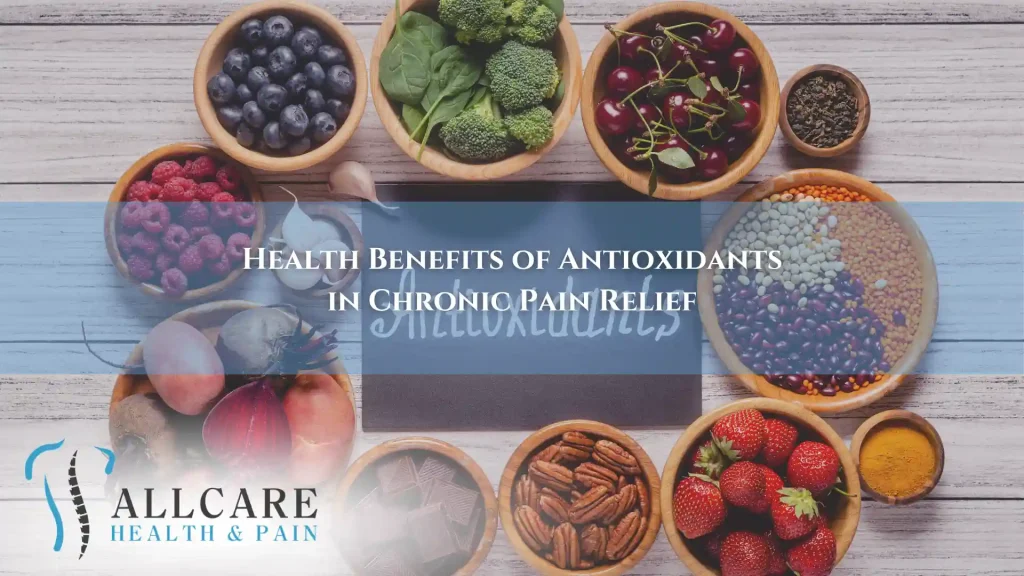
Chronic pain is a debilitating condition that affects millions of people. Several things can cause chronic pain, including injury, disease, inflammation, and aging. Many treatments, such as physical therapy and surgery, are available to manage chronic pain. However, some people turn to antioxidants to help with chronic pain symptoms.
What Are Antioxidants?
Antioxidants are substances that can prevent or slow damage caused by free radicals. Free radicals are unstable molecules produced by normal body processes and external factors, such as:
- Metabolism
- Smoking
- Air pollution
- Industrial chemicals
When your free radical levels get too high, it can cause harm to your body. As a result, your body has its antioxidant defenses to keep the levels in check. Sometimes your body’s defenses are insufficient, and you must turn to other sources.
Health Benefits of Antioxidants
There are several health benefits of antioxidants outside of reducing inflammation, including:
- Reducing the risk of chronic diseases: Antioxidants can help reduce the risk of diseases like cancer, heart disease, and Alzheimer’s.
- Improving immune function: Antioxidants help protect immune cells from damage caused by free radicals.
- Improving skin health: Antioxidants can also benefit the skin by protecting it from damage caused by UV radiation.
- Improving eye health: Antioxidants can help protect your eyes from damage.
- Reducing the risk of cognitive decline: Antioxidants like vitamin E and flavonoids may help reduce the risk of cognitive decline by helping to protect the cerebrovascular blood-brain barrier.
How Antioxidants Can Help with Chronic Pain
Chronic pain is often connected with inflammation, the body’s natural response to injury or stress. Inflammation is a protective response. However, when it persists, it can cause ongoing damage to your tissues and organs, leading to chronic pain. Antioxidants can help reduce inflammation by neutralizing free radicals.
Additionally, antioxidants can improve blood flow and reduce oxidative stress. Oxidative stress may occur when too many free radicals are in your body. This stress can lead to cellular damage and inflammation.
Types of Antioxidants and Their Health Benefits
There are several types of antioxidants, each with its health benefits, including:
- Vitamin A: Studies have shown that vitamin A supplements may benefit conditions like arthritis and fibromyalgia associated with chronic pain. Vitamin A is in various foods, including eggs, dairy products, and fortified cereals.
- Vitamin C: This powerful antioxidant can help reduce inflammation, boost immune function, and improve overall health. Vitamin C is found in many fruits and vegetables, such as citrus fruits, berries, kiwi, broccoli, and peppers.
- Vitamin E is another antioxidant that can reduce inflammation and protect your body from oxidative damage. Vitamin E is in nuts, seeds, vegetable oils, and spinach.
- Selenium: This is a mineral that is critical for human health. Selenium is a component of several enzymes in the body, including those involved in antioxidant defense. If you want to supplement your body’s production of selenium, it can be found in seafood, meat, and whole grains like oats.
- Beta-carotene helps improve immune function and reduce inflammation by converting it into vitamin A. You must be careful not to digest too much, as high vitamin A levels can lead to dizziness, nausea, headaches, and even coma. Beta-carotene is in carrots, sweet potatoes, and mangos.
- Flavonoids: This is a group of antioxidants in many fruits, vegetables, and plant-based products. They have anti-inflammatory, antioxidant, and pain-relieving effects. As a result, they are useful therapy for chronic pain. You can find flavonoids in blueberries, cherries, grapes, and dark chocolate.
How to Incorporate Antioxidants into a Pain Management Plan
 You may want to incorporate antioxidants into your pain management plan if you need chronic pain relief. When you do, you should consider the following:
You may want to incorporate antioxidants into your pain management plan if you need chronic pain relief. When you do, you should consider the following:
- Get your antioxidants from food: You should eat a diet rich in fruits, vegetables, whole grains, nuts, and seeds. You should also limit your intake of processed foods and sugary drinks because they can increase inflammation.
- Talk to your healthcare provider: Before starting a new supplement regimen, contact your doctor. Some antioxidants can interact with medication or have adverse effects if you take too much.
In addition to incorporating antioxidants into your diet, consider other lifestyle changes. Things like regular exercise, stress reduction techniques, and getting enough sleep can help your body.
Incorporate Antioxidants into Your Pain Management Plan in Jersey City, NJ
At AllCare Health & Pain, we offer various services to help you reduce your chronic pain symptoms. Our experienced doctors and physical therapists will work with you to get antioxidants incorporated into your pain management plan.
Our Jersey City pain management team can help you find the right solution for your chronic pain. To discuss your options, contact us today at 201-386-9800 or schedule an appointment online.
Related posts:

